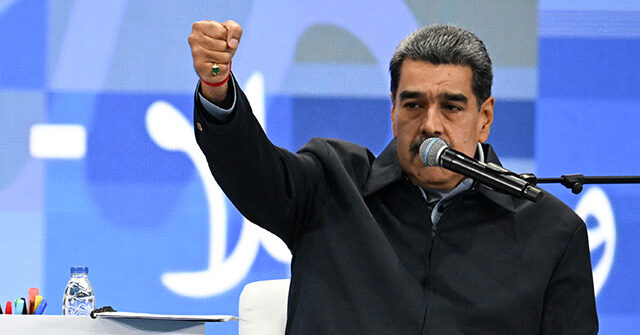On a recent evening, Nicolás Maduro, the socialist dictator of Venezuela, announced the establishment of the “World League of Antifascist Parliamentarians.” This new coalition is positioned as an anti-U.S. network of leftist lawmakers dedicated to combating what Maduro regards as “fascism, neo-fascism, and Zionism.” During his announcement, Maduro declared that the group would include over 300 representatives from 70 nations, with 21 being Latin American and Caribbean countries. The formation of this antifascist body was proclaimed at the conclusion of the World Parliamentary Forum, a two-day event organized by the Venezuelan regime in Caracas, where attendees came together to express their opposition to perceived threats from the United States and its allies.
In his remarks, Maduro characterized the meeting as an imperative moment to vocally oppose fascism in all its forms. He expressed gratitude towards parliamentarians present for the inception of the league, saying, “Venezuela will continue in battle! Venezuela will continue in victory! Long live the Great Fatherland!” Maduro portrayed the U.S. as a principal aggressor in a so-called “fascist conspiracy” aimed at destabilizing and overthrowing his government. He framed this narrative as a reflection of broader geopolitical tensions, reinforcing the Venezuelan socialist regime’s longstanding grievances against U.S. influence in Latin America.
Maduro further articulated that the supposed rise of U.S. fascism is a response to the decline of Western imperialistic dominance. He posited that a “pluri-polar, multicentric world” is emerging, which encompasses rising economic power through alliances such as BRICS—a bloc that Venezuela has been keen to join. He criticized the moral and spiritual bankruptcy of the Western model, asserting that it fails to resonate with contemporary values. Maduro insisted that the West is out of touch with the global shift towards a more diversified and human-centered approach to governance, which he claims is necessary to counter imperialist hegemony.
The urgency expressed during the formation of the league underscored an ongoing debate concerning the rise of extreme right ideologies globally. Maduro interrogated the systemic contempt for Southern nations and migrants, emphasizing the need for a united voice against fascism of all kinds. This rhetoric is characteristic of the Venezuelan leadership’s tendency to rally support against perceived external threats, especially from Western powers, while reclaiming a narrative of solidarity among leftist movements across the globe.
In alignment with the goals of the World League, Jorge Rodríguez, president of the Venezuelan National Assembly, announced plans for an observatory group to monitor sanctions imposed on authoritarian regimes, such as those in Venezuela, Iran, and Russia. This development signals a coordinated effort to challenge the legal and political tools used by the U.S. and its allies against countries that the coalition views as unjustly targeted. Rodríguez also introduced the “ALBA Parliamentary Network for Sovereignty and Peace,” aimed at reinforcing ties among nations within the ALBA-TCP framework, reflecting a commitment to expand anti-imperialist cooperation.
Through these developments, Maduro’s administration is positioning itself as a leader of a global leftist movement rooted in anti-Western sentiment. The creation of these networks signifies a clear intent to mobilize support against sanctions while promoting solidarity among nations perceived as victims of U.S. aggression. This narrative taps into historical grievances and positions countries like Venezuela, Iran, and Russia as defenders of sovereignty against neocolonial encroachments. As discussions of sovereignty, peace, and resistance to imperialism continue to emerge, the implications of such coalitions will be watched closely, both within the political context of Latin America and the broader geopolitical landscape.

